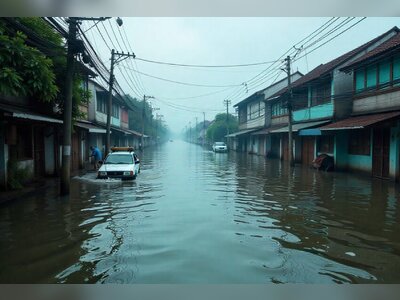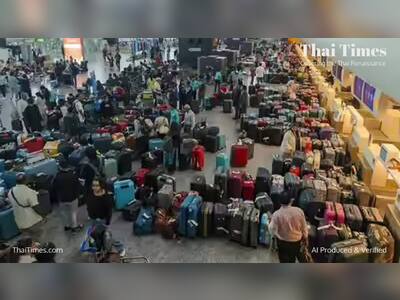Thailand's Destination Thailand Visa Generates Strong Demand for Remote Workers
One year post-launch, Thailand's DTV visa program attracts over 35,000 applicants, reshaping the economic landscape for tourism and remote work.
Thailand’s Destination Thailand Visa (DTV), launched on July 15, 2024, has attracted over 35,000 applications within its first year, significantly impacting the nation's economic and tourism sectors.
The DTV was developed to target digital nomads and remote workers, providing a framework for long-term stays that aligns with ongoing post-pandemic recovery efforts.
The program's appeal lies in its flexibility, allowing multiple entries over a five-year period with individual stays of up to 180 days.
This stands in contrast to similar visa offerings in neighboring countries like Malaysia and Indonesia, which often impose shorter, non-renewable terms.
The influx of remote workers has played a crucial role in transforming popular tourist areas in Thailand into vibrant communities centered around co-working spaces, health and wellness activities, and local culture.
Cities such as Bangkok are increasingly becoming hubs for digital nomads attracted by affordable healthcare, robust digital infrastructure, and a rich urban lifestyle.
Despite Thailand's political challenges and stagnant economic growth—which the World Bank projects to be at 1.8% in 2025, down from a previous estimate of 2.9%—the DTV program has emerged as a bright spot.
The country has adjusted its tourism forecasts, reducing expected arrivals from 39 million to 35.5 million, particularly given a drop in visitors from China amid safety concerns.
As international travel resumes after pandemic restrictions, the need for consistent revenue from non-traditional tourist seasons is becoming more apparent.
Remote workers contribute to economic stability during quieter months, particularly from July to September, known as the wet season.
The DTV has been instrumental in attracting diverse populations, from wellness practitioners to technology entrepreneurs, to regions previously reliant on transient tourist activity.
These long-term visitors engage with local communities more deeply, often renting extended accommodations and participating in cultural activities such as Muay Thai training and yoga.
However, the DTV holders face challenges, including restrictions on opening domestic banking accounts, aimed at preventing financial crime and unauthorized employment.
This limitation can complicate daily transactions and financial management for remote workers, creating reliance on foreign banking systems.
Community feedback indicates that while the DTV fosters a supportive environment for networking and collaborative opportunities, some remote workers encounter difficulties balancing work-life dynamics in a city filled with distractions.
Koh Phangan, traditionally known for its party scene, is witnessing a shift as remote workers begin to influence its demographic, bringing a focus on wellness and productivity over nightlife.
Such transformations reflect a broader change in how Thailand is positioning itself in the global landscape for remote work, leveraging its culture and infrastructure to attract a stable and diverse international community.
Overall, Thailand's ongoing efforts to accommodate remote workers signal a deliberate shift towards enhancing its appeal as a long-term residence for the increasingly mobile workforce.
The DTV was developed to target digital nomads and remote workers, providing a framework for long-term stays that aligns with ongoing post-pandemic recovery efforts.
The program's appeal lies in its flexibility, allowing multiple entries over a five-year period with individual stays of up to 180 days.
This stands in contrast to similar visa offerings in neighboring countries like Malaysia and Indonesia, which often impose shorter, non-renewable terms.
The influx of remote workers has played a crucial role in transforming popular tourist areas in Thailand into vibrant communities centered around co-working spaces, health and wellness activities, and local culture.
Cities such as Bangkok are increasingly becoming hubs for digital nomads attracted by affordable healthcare, robust digital infrastructure, and a rich urban lifestyle.
Despite Thailand's political challenges and stagnant economic growth—which the World Bank projects to be at 1.8% in 2025, down from a previous estimate of 2.9%—the DTV program has emerged as a bright spot.
The country has adjusted its tourism forecasts, reducing expected arrivals from 39 million to 35.5 million, particularly given a drop in visitors from China amid safety concerns.
As international travel resumes after pandemic restrictions, the need for consistent revenue from non-traditional tourist seasons is becoming more apparent.
Remote workers contribute to economic stability during quieter months, particularly from July to September, known as the wet season.
The DTV has been instrumental in attracting diverse populations, from wellness practitioners to technology entrepreneurs, to regions previously reliant on transient tourist activity.
These long-term visitors engage with local communities more deeply, often renting extended accommodations and participating in cultural activities such as Muay Thai training and yoga.
However, the DTV holders face challenges, including restrictions on opening domestic banking accounts, aimed at preventing financial crime and unauthorized employment.
This limitation can complicate daily transactions and financial management for remote workers, creating reliance on foreign banking systems.
Community feedback indicates that while the DTV fosters a supportive environment for networking and collaborative opportunities, some remote workers encounter difficulties balancing work-life dynamics in a city filled with distractions.
Koh Phangan, traditionally known for its party scene, is witnessing a shift as remote workers begin to influence its demographic, bringing a focus on wellness and productivity over nightlife.
Such transformations reflect a broader change in how Thailand is positioning itself in the global landscape for remote work, leveraging its culture and infrastructure to attract a stable and diverse international community.
Overall, Thailand's ongoing efforts to accommodate remote workers signal a deliberate shift towards enhancing its appeal as a long-term residence for the increasingly mobile workforce.











